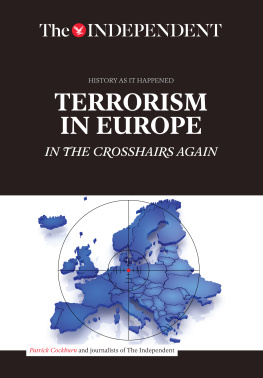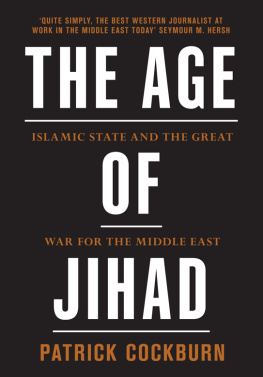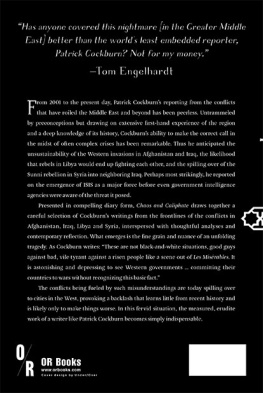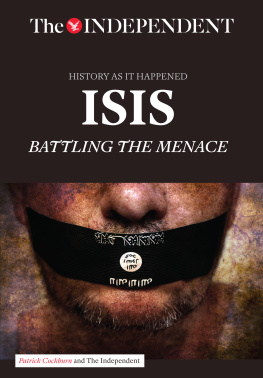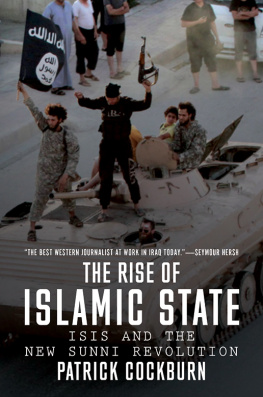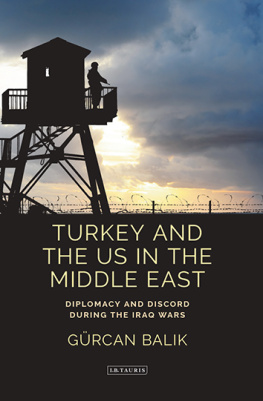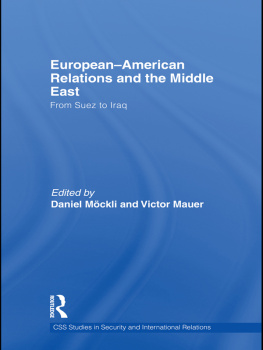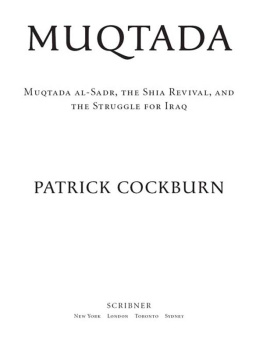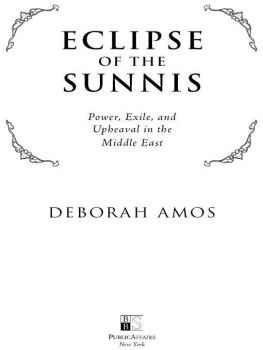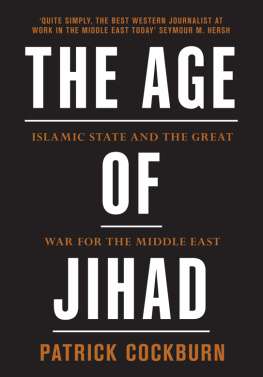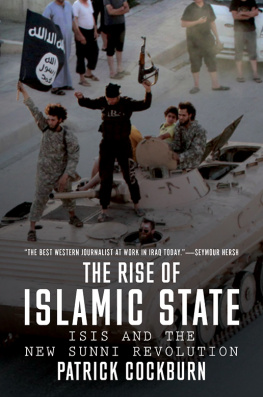Cockburn - Iraq: The West Shakes Up The Middle East
Here you can read online Cockburn - Iraq: The West Shakes Up The Middle East full text of the book (entire story) in english for free. Download pdf and epub, get meaning, cover and reviews about this ebook. City: United States, year: 2016, publisher: Mango Media, genre: Detective and thriller. Description of the work, (preface) as well as reviews are available. Best literature library LitArk.com created for fans of good reading and offers a wide selection of genres:
Romance novel
Science fiction
Adventure
Detective
Science
History
Home and family
Prose
Art
Politics
Computer
Non-fiction
Religion
Business
Children
Humor
Choose a favorite category and find really read worthwhile books. Enjoy immersion in the world of imagination, feel the emotions of the characters or learn something new for yourself, make an fascinating discovery.

- Book:Iraq: The West Shakes Up The Middle East
- Author:
- Publisher:Mango Media
- Genre:
- Year:2016
- City:United States
- Rating:3 / 5
- Favourites:Add to favourites
- Your mark:
- 60
- 1
- 2
- 3
- 4
- 5
Iraq: The West Shakes Up The Middle East: summary, description and annotation
We offer to read an annotation, description, summary or preface (depends on what the author of the book "Iraq: The West Shakes Up The Middle East" wrote himself). If you haven't found the necessary information about the book — write in the comments, we will try to find it.
Iraq: The West Shakes Up The Middle East — read online for free the complete book (whole text) full work
Below is the text of the book, divided by pages. System saving the place of the last page read, allows you to conveniently read the book "Iraq: The West Shakes Up The Middle East" online for free, without having to search again every time where you left off. Put a bookmark, and you can go to the page where you finished reading at any time.
Font size:
Interval:
Bookmark:

Independent Print Limited
Copyright 2016 The Independent. All rights reserved.
This material may not be published, broadcast, rewritten or redistributed.
Published by Mango Media, Inc.
www.mango.bz
No part of this publication may be reproduced, distributed or transmitted in any form or by any means, without prior written permission.
This is a work of non-fiction adapted from articles and content by journalists of The Independent and published with permission.
Front Cover Image: The Independent
Back Cover Image: The Independent
IRAQThe West Shakes Up the Middle East
ISBN: 978-1-63353-438-4

"the West, led by the US and Sunni states, saw the uprisings in the Arab world as a chance to get rid of regimes with whom they were at oddsbut instead the warmay end up doing more damage to Iran's rivals such as Saudi Arabia, Turkey and the Gulf monarchies."
Patrick Cockburn, December 2015, The Independent
Table of Contents
FOREWORD
It is over 13 years since the start of the war in Iraq which led to the toppling of Saddam Hussein. The diplomatic map of the world has been redrawn as a consequence. Inquiry after inquiry has studied the legality of the conflict. Political reputations have been made and lost. But what of Iraq itself and the rest of the Middle East? What has been the impact of the West on Iraq and the region as a whole? Who have been the winners? Who have been the losers? In what direction is the region headed?
A remarkable feature of the wider Middle East over the past 15 years has been that the most radical instruments of change have been the US and its allies, such as Saudi Arabia and the Gulf monarchies, which should have had the greatest interest in maintaining the status quo.
Provoked by 9/11, a US-led coalition overthrew the Taliban in Afghanistan in 2001 and Saddam Hussein in Iraq in 2003. The West had disposed of two of Irans worst enemies without Iran having to lift a finger.
In 2011 the West, led by the US and Sunni states, saw the uprisings in the Arab world as a chance to get rid of regimes with whom they were at odds. The war in Syria was an opportunity to weaken Iran by eliminating its biggest ally in the Arab world. Instead the war, and likewise the one in Yemen, may end up doing more damage to Iran's rivals such as Saudi Arabia, Turkey and the Gulf monarchies.
Patrick Cockburn, The Independent's internationally acclaimed foreign correspondent and 2015 British Foreign Affairs Journalist of the Year, has analyzed and reported extensively on the Middle East and Saddam's former empire in hundreds of articles since 2001. The best of Patrick Cockburns analysis and commentary is compiled in this book, providing first-hand insight into what is really happening in this critical region of our world.
MESSING-UP THE MIDDLE EAST (2003-2006)

USS Abraham Lincoln, site of President Bushs Mission Accomplished speech on 1 May 2003
Thursday, 24 July 2003
CHAOS AND RAGE
There used to be a mosaic of President George H W Bush on the floor at the entrance to the al-Rashid Hotel in Baghdad. It was placed there soon after the first Gulf War in 1991 and was a good likeness, though the artist gave Bush unnaturally jagged teeth and a slightly sinister grimace. The idea was that nobody would be able to get into the hotel, where most foreign visitors to Iraq stayed in the 1990s, without stepping on Bush's face. The mosaic did not long survive the capture of the city on 9 April, 2003 and the takeover of the al-Rashid by US officials and soldiers. One American officer, patriotically determined not to place his foot on Bush's features, tried to step over the mosaic. The distance was too great. He strained his groin and had to be hospitalised. The mosaic was removed.
Almost all of the thousands of pictures of Saddam which used to line every main street in Baghdad have gone, though for some reason the one outside the burned-out remains of the old Mukhabarat (intelligence) headquarters survives. My favourite was straight out of The Sound of Music: it showed Saddam on an Alpine hillside, wearing a tweed jacket, carrying an alpenstock and bending down to sniff a blue flower. Other equally peculiar signs of Saddam's presence remain. The Iraqi Natural History Museum was thoroughly ransacked by looters, who even decapitated the dinosaur in the forecourt. In the middle of one large ground-floor gallery almost the only exhibit still intact is a stuffed white horse which, when living, belonged to Saddam. Wahad Adnan Mahmoud, a painter who also looks after the gallery, told me the horse had been given to the Iraqi leader in 1986 by the King of Morocco. The King had sent a message along with it saying he hoped that Saddam would ride the horse through the streets of Baghdad when Iraq won its war with Iran. Before this could happen, however, a dog bit the horse, and it died. Saddam issued a Republican Decree ordering the dog to be executed.
"I don't know why the looters didn't take the horse - they took everything else," complained Mahmoud, who was in the wreckage of his office painting a picture of Baghdad in flames. "It isn't even stuffed very well." The horse, he added, was not the only dead animal which had been sent from Saddam's Republican Palace to be stuffed by the museum. One day an official from the palace had arrived with a dead dolphin in the back of a truck. He said the leader wanted it stuffed. The museum staff protested that this was impossible because a dolphin's skin contained too much oil. Mahmoud laughed as he remembered the terrified expression on the official's face when told that Saddam's order could not be obeyed.
Saddam had three enthusiasms in the 1990s, two of which still affect the appearance of Baghdad. Soon after defeat in Kuwait he started obsessively building palaces for himself and his family. None of these is likely to be knocked down since they now serve as bases for the US Army and the Coalition Provisional Authority (CPA). Paul Bremer, the head of the CPA, has his headquarters in the enormous Republican Palace beside the Tigris, where he and his staff live in an isolation comparable to Saddam's. Then, in the mid-1990s, Saddam began to build enormous mosques, the largest of which, the Mother of Battles mosque at the old Muthana municipal airport, was only beginning to rise from its foundations when the regime collapsed.
Saddam's third craze, beginning about three years ago, was more surprising. He started to write novels. He dictated them to his secretaries and they were published anonymously in cheap editions, but Iraqis were left in no doubt as to the author. The critical response was adulatory, the print runs enormous. After the fall of Baghdad, documents were found in the Mukhabarat headquarters instructing agents to buy the books and get their contacts to do the same. Copies of his most recent novel, The Impregnable Fortress, as well as an earlier volume called Zabiba and the King, are still for sale in the Friday book market on al-Mutanabbi Street.
They cannot do much about the palaces and mosques Saddam built, but the US Army and the CPA are obsessed with removing every mention of his name from Baghdad. You cannot enter the main children's hospital without walking through a stream of raw sewage, and on some days there is no electricity or water, but earlier this month two cranes were at work removing large green overhead signs for Saddam International Airport. The US officials now in charge of Iraq seem to believe that their problems will be over if all evidence of Saddam's existence is eliminated. This obsession explains in part the political failure of the US and Britain after their swift military victory. Their demonisation of Saddam produces a picture of Iraqi society as being wholly dominated by one man. In fact, the regime's support base was always narrow - this was the reason for its exceptional cruelty.
Next pageFont size:
Interval:
Bookmark:
Similar books «Iraq: The West Shakes Up The Middle East»
Look at similar books to Iraq: The West Shakes Up The Middle East. We have selected literature similar in name and meaning in the hope of providing readers with more options to find new, interesting, not yet read works.
Discussion, reviews of the book Iraq: The West Shakes Up The Middle East and just readers' own opinions. Leave your comments, write what you think about the work, its meaning or the main characters. Specify what exactly you liked and what you didn't like, and why you think so.

